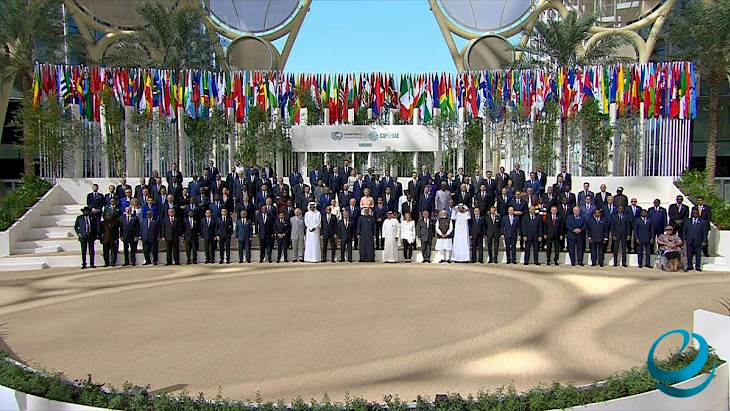The most important climate event of 2023, held under the auspices of the UN, COP28 Summit, has begun its two-week proceedings in Dubai.
At the official event, leaders from over 70 countries have initiated discussions on specific measures to accelerate actions against climate change.
The proposals made by the presidents of the Central Asian states and how they will help avert a climate catastrophe are detailed in a material by the Eurasiatoday.ru portal.
President of Kyrgyzstan Sadyr Japarov, in his speech, noted that according to experts' assessments, Kyrgyzstan and the entire Central Asia experience a more pronounced temperature increase than the global average.
"Climate change has already led to intensive glacier melting and a reduction in glacier area, a sharp increase in periods of drought and low water levels, deterioration of people's health, and an increasing number of natural disasters. The damage from direct and indirect losses is increasing every year," stated the president.
Japarov emphasized that glaciers in the mountainous systems of Kyrgyzstan and Central Asia are vital for water and energy security and food safety.
The Kyrgyz leader also highlighted:
- By 2050, within the framework of the "green" development, the Kyrgyz Republic plans to achieve carbon neutrality.
- Kyrgyzstan intends to implement projects in the field of renewable energy, including the construction of hydroelectric power stations.
- The Kyrgyz Republic invites investors to invest in "green projects" in the country.
He called on the global community to support vulnerable mountainous countries through:
- Launching a Fund for Loss and Damage,
- Providing direct financial support and state-of-the-art technologies on a grant basis,
- Creating mechanisms to exchange external debt for climate projects.
"Our country currently utilizes only 13% of the total potential of 142.5 billion kilowatt-hours. Through the launch of renewable energy projects, more efficient use and management of water resources can be achieved in Kyrgyzstan," he concluded.
President of Kazakhstan Kassym-Jomart Tokayev particularly emphasized that the greatest danger is posed to small island developing states, developing landlocked countries, and the least developed countries.
"Kazakhstan fully supports the UN's urgent call for specific actions to preserve the environment for future generations. We became the first country in the region to ratify the Paris Agreement and adopt the Carbon Neutrality Strategy by 2060," added the Kazakh leader.
In his speech, he also mentioned the development of Kazakhstan's new Environmental Code, which will contribute to the adaptation of green technologies in every sector of the national economy.
"Kazakhstan actively supports private green initiatives. For example, the Association of Packaging of the Republic of Kazakhstan is working on projects to eliminate plastic waste, contributing to environmental protection. Nur-Sultan has joined the Global Methane Pledge," he added.
Tajik leader Emomali Rahmon, speaking at a climate forum, stated that "Tajikistan, with 93 percent of its territory consisting of mountains, is one of the most vulnerable countries to the consequences of climate change."
Key points from Rahmon's speech:
- The Tajikistan government is implementing the National Climate Change Adaptation Strategy for the period up to 2030.
- Tajikistan's share of greenhouse gas emissions is small, ranking 130th globally in terms of low emissions.
- Tajikistan produces 98% of its electricity from hydroelectric power stations, ranking sixth in the world for the percentage of "green energy" generated from renewable sources.
- The Tajikistan government has adopted and is implementing the "Green Economy Development Strategy for 2023-2037," aimed at efficient use of natural resources and attracting "green" investments and technologies.
Turkmenistan's President Serdar Berdymukhammedov reminded that during the 26th session of the UN Framework Convention on Climate Change Conference of the Parties (COP26) in Ashgabat, he expressed support for the new initiative on the Global Methane Pledge.
Taking into account the recommendations of the UN Framework Convention on Climate Change and with active support from the UN Development Programme, Ashgabat prepared and approved in May 2022 the Nationally Determined Contribution (NDC) of Turkmenistan to the Paris Agreement on climate.
This strategic document envisions a 20% reduction in greenhouse gas emissions by 2030 compared to the 2010 level.
"Today, from this high tribune, Turkmenistan officially declares its commitment to the Global Methane Pledge," concluded President Serdar Berdymukhammedov.
Uzbekistan's President Shavkat Mirziyoyev, in his speech at the global climate summit, stated that climate problems are the main threat to sustainable development worldwide.
Key points highlighted by Mirziyoyev:
- The increase in air temperature in the Central Asian region is twice the global average. In recent years, the number of extremely hot days has doubled, and one-third of the glacier area has melted.
- Soil erosion processes in the region negatively impact the lives of over 30 million people. Severe dust and sandstorms become a common phenomenon.
- Challenges such as a shortage of drinking water, air pollution, loss of biodiversity, and a sharp decline in agricultural productivity are intensifying.
- Transitioning to a green economy and achieving carbon neutrality is a priority strategic task for the New Uzbekistan.
"In recent years, the share of alternative energy in the Republic of Uzbekistan has doubled. Together with the UAE, Saudi Arabia, Qatar, China, Turkey, and other foreign partners, we will build 25 gigawatts of renewable energy capacity by 2030. We have taken the first practical steps on the 'green hydrogen' production project.
Under the 'Green Space' initiative, 200 million seedlings are planted annually in Uzbekistan. We aim to increase the green areas in cities to 30%. To create a solid shield on the dry bed of the Aral Sea, we have planted forests on an area of 2 million hectares," concluded Mirziyoyev.
Source: Eurasiatoday.ru
CentralasianLIGHT.org
December 2, 2023

